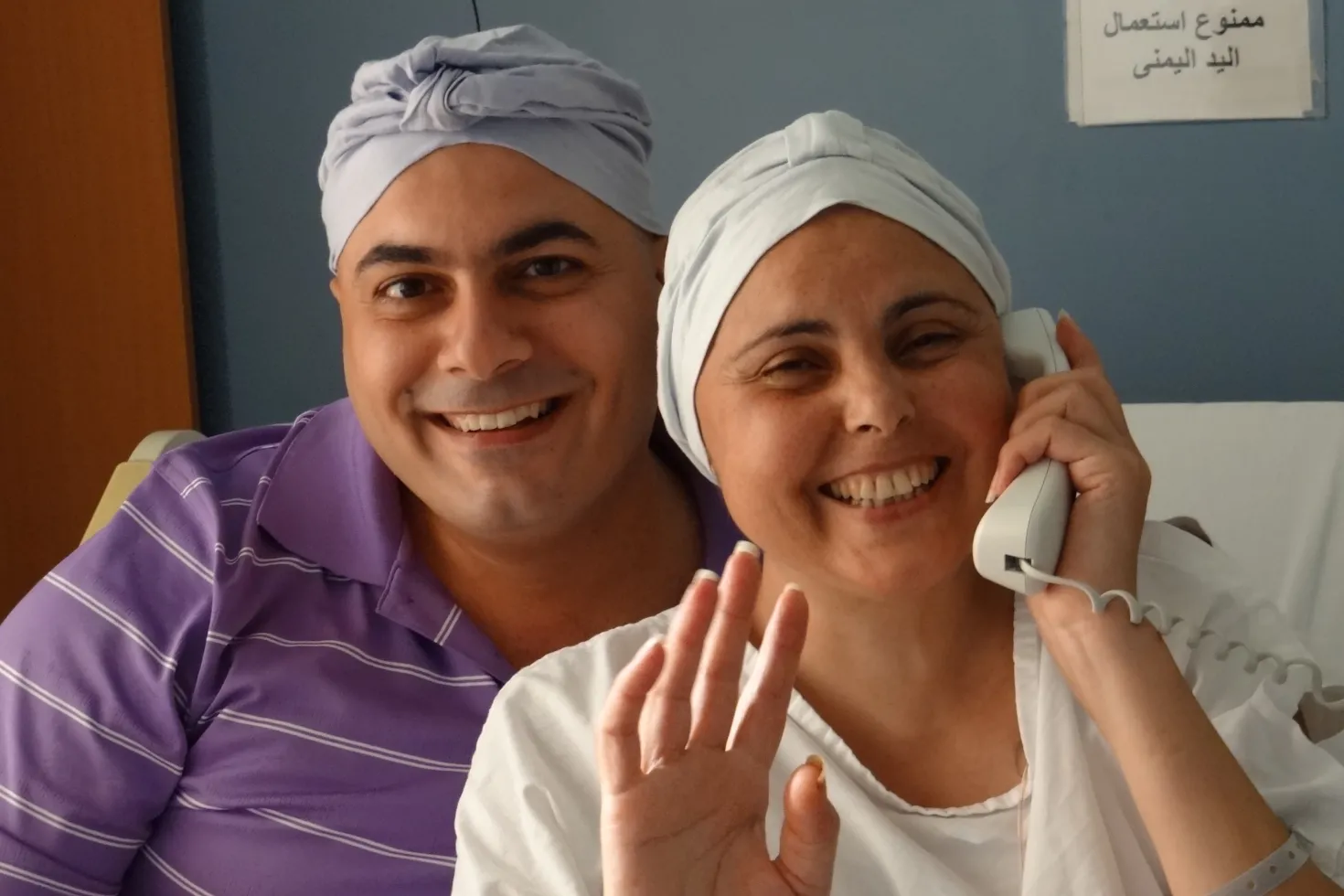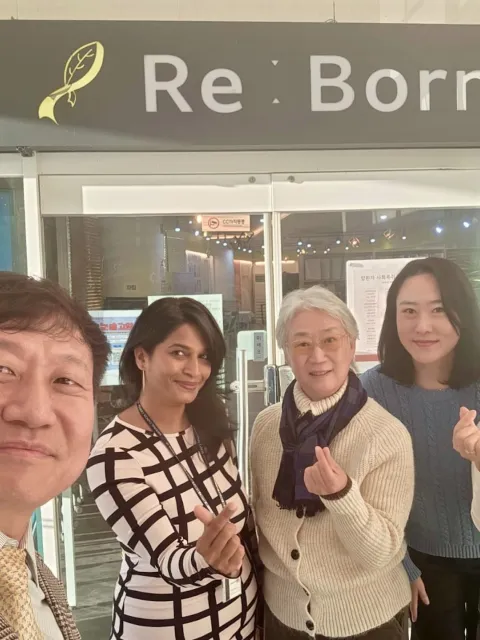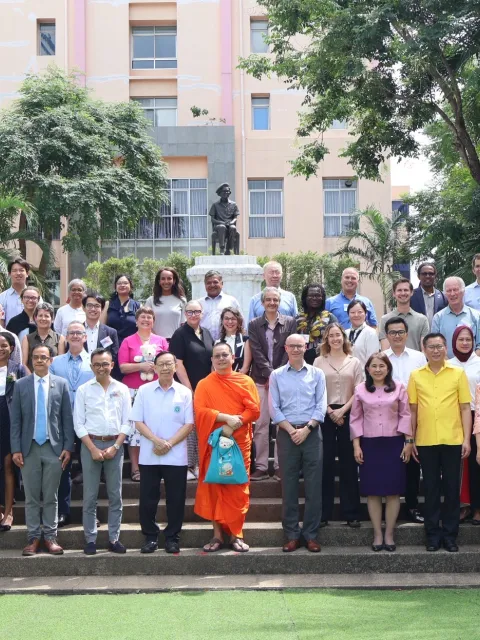The legacy of Barbara Nassar: A couple’s experience with cancer helps shape cancer policy in Lebanon
Through the Barbara Nassar Association for Cancer Support in Lebanon, a UICC member, Hani Nassar is demonstrating how engaging people affected by cancer in speaking about and taking part in decision-making can influence national cancer strategies, improve access to care, and strengthen support systems.

Hani and Barbara Nassar
HIGHLIGHTS
-
After Barbara Nassar’s terminal diagnosis, she and her husband travelled across Lebanon in a caravan to raise awareness about the lack of support for adults with cancer, ending at the presidential palace.
-
The Barbara Nassar Association was founded on World Cancer Day 2014, fulfilling Barbara’s wish to support others with cancer shortly before she passed away.
-
The Association became a national voice on cancer, from redistributing medicines to leading protests, meeting with ministers, shaping policies, and exposing systemic gaps.
-
In 2023, Lebanon’s first national cancer control plan was launched with input from the Association, including a new digital platform to track medication availability.
-
In 2025, the Association opened Lebanon’s first Cancer Centre for Supportive Care for adults, offering free psychological, legal, nutritional and wellness services.
In 2009, Barbara Nassar fractured her neck. The injury led to an unexpected diagnosis of breast cancer with bone metastasis. Doctors gave her a poor prognosis, suggesting she might not live beyond a year. She began treatment immediately, however, ultimately undergoing multiple surgeries and more than 100 chemotherapy sessions.
During this time, Barbara and her husband Hani encountered a health system that offered little structured support to adults with cancer. While there are several organisations in Lebanon dedicated to assisting children and their families, adults were often left without guidance, psychological support, or help in navigating treatment.
“At that time, we discovered that a lot of people in Lebanon were dying because they had to stop their treatment – not because the treatment failed, but because it was unaffordable,” Hani recalled. “When I asked Barbara’s doctor what I should do if I couldn’t afford the medication he was prescribing, he told me: ‘If you have money, you treat her. If not, you stop – like the others.’”
In response, and while Barbara was still receiving treatment, the couple undertook an 80-day journey across Lebanon in a caravan. Their aim was to encourage people with cancer to continue living fully, to speak openly about their experience, and to call the attention of decision-makers to the gaps in care that many faced alone.
They visited 1,655 villages, collecting signatures on a Lebanese flag from local mayors, citizens, and – at the end of the journey – from the President, who welcomed them to the presidential palace.
“It was a powerful moment,” Hani said. “People often see someone with cancer as someone waiting to die. But here was Barbara, five years after being told she wouldn’t live more than a year, standing before the president and showing that people with cancer have something to say. We didn’t want charity, we wanted change.”
From grief to grassroots action
On 4 February 2014, World Cancer Day, and only days before she passed away, Barbara recorded a message from her hospital bed, calling for greater support for adults with cancer in Lebanon.
The following day, the Minister of Interior signed the authorisation for the creation of the Barbara Nassar Association for Cancer Support, founded by her husband to honour her wish that adults with cancer receive the moral, medical, and practical support that she had lacked. Barbara passed away shortly after.
At first, the Association worked from a small room in Hani’s home. It began by collecting unused medication from individuals and redistributing it to people who could not otherwise access treatment, a service it continues to provide.
“In Lebanon, when the Ministry of Public Health doesn’t provide medications, you have to pay out of pocket,” Hani said. “It’s not sustainable. We have arranged for people who have finished their treatment and have medications left over to bring them to us. We check the expiry dates and redistribute them to people who can’t afford to buy them.”
Over time, this informal system became a critical lifeline, particularly as Lebanon faced compounding crises. The country’s financial crisis began in late 2019, triggering widespread inflation and severely affecting public services. The COVID-19 pandemic, which reached Lebanon in early 2020, placed additional strain on the health system, disrupting treatment access and delaying diagnostics. The crisis deepened even further with the Beirut port explosion in August 2020.
Medication shortages became acute. In some cases, essential cancer medicines were unavailable for months at a time. People were forced to turn to the black market or obtain drugs from abroad, often paying in scarce US dollars. Hani noted that corruption and political interference further complicated distribution. “There were times when the Ministry said it had no budget for medication, while the same drugs were available through unofficial channels,” he said.
During this time, Hani managed to expand the Association’s work, developing it into a national platform for advocacy, rooted in the lived experience of people with cancer. He organised public awareness events and lectures, mobilised legal support, and pushed for greater accountability from health authorities.
In 2021, the Association led a sit-in outside the UN offices in Beirut, protesting the fact that the government had failed to secure cancer medicines for five consecutive months. The following year, it staged a symbolic funeral on World Cancer Day, placing a coffin in front of demonstrators in central Beirut to represent the people who had died after being denied treatment.
That action received significant media attention and triggered a meeting between Hani and the then Minister of Public Health, Dr Firas Abiad. For the first time, the Association was formally invited to participate in policy discussions at the national level.
From advocacy to national policy
The meeting with the Minister of Public Health marked a shift in how people affected by cancer were included in policy conversations. Hani was invited to contribute to discussions that would inform the country’s first national cancer control plan (NCCP).
“When we first entered the ministry, it felt like a formality,” Hani said. “But then they began to listen. They didn’t just take notes, they asked for input. That was new.”
The Association submitted recommendations based on its direct engagement with people across the country, including proposals to simplify treatment pathways, improve medication delivery, and provide psychosocial support as part of routine care.
The plan was developed with support from the World Health Organization and UICC, and officially launched on World Cancer Day 2023. It included measures to improve the availability of and access to essential services for cancer prevention, early detection, treatment, and palliative care.
One of the most visible outcomes was the creation of a new digital platform for managing cancer medications. Known as Aman (meaning ‘safety’ in Arabic), the platform allows doctors to upload treatment protocols for approval by the Ministry of Public Health. Once approved, medications are distributed under the patient’s name to a designated hospital or pharmacy. People living with cancer can register to receive alerts when their medications have been approved and are ready for pickup.
“This was a demand we had raised for years,” said Hani. “When you’re managing cancer, uncertainty about your next dose of medication is devastating. Aman helps restore a sense of trust in the system.”
The Association also continued to press for structural changes, advocating for the introduction of sin taxes on products such as tobacco and alcohol to help fund the budget for cancer services. It also called for the integration of people with cancer into public campaigns and planning processes, not just as beneficiaries but as contributors.
UICC has supported the Barbara Nassar Association's work since 2021 through its Patient Group Mentoring Programme, and Hani has spoken to an international audience at events such as UICC's World Cancer Leaders’ Summit.
Building a lasting model of support
In 2025, the Barbara Nassar Association opened the Barbara Nassar Cancer Centre for Supportive Care, Lebanon’s first dedicated facility offering non-clinical services to adults affected by cancer, services that address the everyday challenges faced by people living with cancer.
The Centre provides access to psychological counselling, nutritional advice, physiotherapy, legal aid, and a range of wellness activities such as yoga, group support, and art therapy. It also offers beauty care sessions, helping individuals manage some of the physical effects of treatment. All services are free of charge.
“We built what Barbara wished she had when she was diagnosed,” said Hani. “A place where people with cancer are treated with dignity, not just as patients but as people with stories, needs, and rights.”
The centre also collaborates with universities and medical institutions, hosting students and young doctors to introduce them to more holistic approaches to care. Hani believes this educational role is key to changing how the next generation of health professionals views their work: not only as clinical providers, but as partners in the broader experience of living with cancer.
For Hani, the centre is both a response to a system that once left people feeling invisible, and a demonstration of what can be achieved when people with lived experience are involved in shaping care. While challenges remain, particularly in the context of Lebanon’s ongoing economic crisis, the Association’s work has helped shift how cancer is discussed, supported, and understood in the country.
“This began with Barbara’s story,” he said. “But now, it is the story of every person with cancer in Lebanon. All of them are raising their voices for the same cause.”
Last update
Tuesday 09 September 2025
